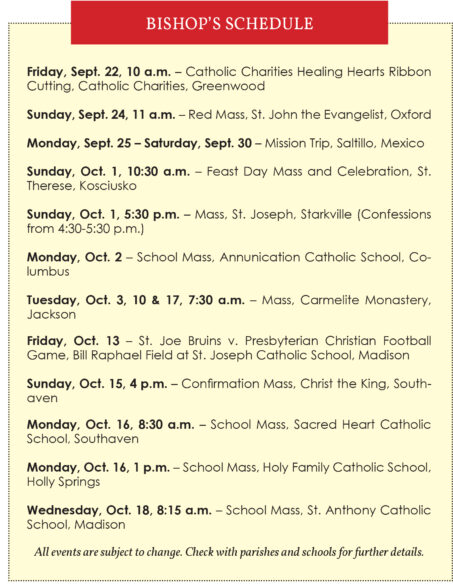By Bishop Joseph R. Kopacz, D.D.
Pope Francis, furthering the tradition of modern popes, has made pastoral visits around the world. He has gathered millions on the beaches of Brazil and the open fields of the Philippines, and recently, one and a half million pilgrims flocked to Portugal for World Youth Day. But there have been much smaller gatherings that are no less extraordinary. A few years ago, during the pandemic Pope Francis undertook a pastoral visit to the neighboring county of Iraq, the first of its kind, to encourage the suffering church in this war-torn nation, and to pray for peace. In Mosul, formerly occupied by ISIS, the pope proclaimed. “Today, however, we reaffirm our conviction that fraternity is more durable than fratricide, that hope is more powerful than hatred, that peace more powerful than war.” These words echoed around the world.
As September dawned upon the world the Holy Father went much further east than Iraq, flying 10 hours across Asia, even over Chinese airspace to Ulaanbaatar, the capital of Mongolia to proclaim the Gospel, to celebrate the Eucharist, and to engage government, civic, ecumenical and inter-faith leaders with words of faith, fraternity and solidarity. Immediately upon landing it was obvious that Pope Francis had gone to his beloved margins of our world and our Catholic faith. There were not hundreds of thousands to welcome his motorcade, rather hundreds, like two hundred. At the closing Mass of this pastoral visit in the Steppe Arena in Ulaanbaatar there were an estimated 2,500 hundred in attendance, nearly all of the 1,500 Catholics in Mongolia, along with a 1,000 additional pilgrims from around the world.
However, during this time of Eucharistic renewal, the Pope gave an excellent message regarding all of humanity’s hunger and thirst fulfilled in the Gospel.

“With the words of the Responsorial Psalm, we prayed: O God, my soul thirsts for you; my flesh faints for you, as in a dry and weary land where there is no water. (Ps 63:2) We are that dry land thirsting for fresh water, water that can slake our deepest thirst. Our hearts long to discover the secret of true joy, a joy that even in the midst of existential aridity, can accompany and sustain us. Deep within us, we have an insatiable thirst for happiness; we seek meaning and direction in our lives, a reason for all that we do each day. More than anything, we thirst for love, for only love can truly satisfy us, bring us fulfilment; only love can make us happy, inspire inner assurance and allow us to savor the beauty of life.
“Dear brothers and sisters, the Christian faith is the answer to this thirst; it takes it seriously, without dismissing it or trying to replace it with tranquilizers or surrogates. For in this thirst lies the great mystery of our humanity: it opens our hearts to the living God, the God of love, who comes to meet us and to make us his children, brothers and sisters to one another.”
The culmination of Pope Francis’ homily was the heart of our way of life as the Lord’s disciples.
“This, dear brothers and sisters, is surely the best way: to embrace the cross of Christ. At the heart of Christianity is an amazing and extraordinary message. If you lose your life, if you make it a generous offering in service, if you risk it by choosing to love, if you make it a free gift for others, then it will return to you in abundance, and you will be overwhelmed by endless joy, peace of heart, and inner strength and support; and we need inner peace.”
In his spontaneous remarks at the end of Mass, the Pope made a sublime association between Eucharistic spirituality and the Mongolian language.
“I was reminded that in the Mongolian language the word for ‘thank you’ comes from the verb ‘to rejoice.’”

Indeed, the Mass is our great prayer of thanksgiving as our spirits rejoice in God our Savior who in Jesus Christ poured out his life for us in an act of eternal love. Pope Francis went on to say that “to celebrate Mass in this land brought to my mind the prayer that the Jesuit Father Pierre Teilhard de Chardin offered to God exactly a hundred years ago, in the desert of Ordos, not far from here. What was Father Teilhard de Chardin, SJ doing in Mongolia? He was engaged in geological research.”
The Pope recalled that his Jesuit brother fervently desired to celebrate Holy Mass, but lacked bread and wine. So, he composed his “Mass on the World,” expressing his oblation in these words: “Receive, O Lord, this all-embracing host, which your whole creation, moved by your magnetism, offers you at the dawn of this new day.” This priest, often misunderstood, had intuited that “the Eucharist is always in some way celebrated on the altar of the world” and is “the living center of the universe, the overflowing core of love and of inexhaustible life.”
For the more than 3 million who are not Catholic in Mongolia and to billions around the world, Francis of Rome wove a marvelous pattern with Jesus Christ, through whom and for whom all things were made, (Colossians 1:16) the Eucharist and the world.
